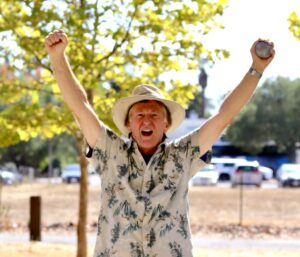
As it is well-known, the game of pétanque originated in the South of France where nights are usually mild, and the natives expansive and chatty. Just ask my friend Louis Toulon, a typical Provençal.
To him and all his associates, a game is a mix of skills and entertainment. A bantering occasion, full of teasing, curses, and fake indignation.
Those unfamiliar with the game should know that pétanque is not just a physical activity but also a way to decompress; to release emotional strain and latent anxiety. In a spirited game, yells and curses abound, and that’s the way it should be.
To paraphrase a famous sporting quote, “All pétanque players are bilingual. They know French and profanity.”
Profanity, when properly delivered can be highly therapeutic. When playing, contestants should not be afraid to let go of their inner emotions. If they don’t, a match can quickly become very dull. And there is nothing worse than a lifeless game.
A sudden thought: in the spirit of pétanque, prospective candidates might take a few classes of the art of cursing before taking up the game. This way they would easily blend in with more seasoned players.
“Sure, there have been injuries and even some deaths in pétanque – but none of them really that serious.” – Alan Minter
In pétanque, there are two categories of games, casual and competitive. A casual game is a lively occasion, while competition is far more serious and subdued. Some players take the game very seriously, especially when big money is involved. The higher the prizes, the more serious and quieter the players.
“I’d run over my own mother to win a pétanque tournament.”
Yes, that’s how serious a tournament can be!
Look up, laugh loud, talk big, keep the color in your cheek and the fire in your eye, adorn your person, maintain your health, your beauty, and your animal spirits. William Hazlitt
This is the true spirit of pétanque!
Alain
